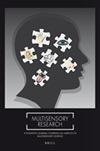四冲程表观运动能有效诱发视觉自我运动感知:利用膨胀、旋转和平移运动进行的研究
IF 1.8
4区 心理学
Q3 BIOPHYSICS
引用次数: 0
摘要
本研究探讨了没有连续视觉位移的视觉运动是否能有效诱导自我运动感知(vection)。实验中使用了四行程视运动(4SAM)作为视觉诱导物。4SAM 图案包含与真实运动图案等效的亮度定义的运动能量,被试根据运动能量感知单向运动,但没有位移(视觉元素在原地闪烁)。实验结果表明,4SAM 刺激可以有效地诱导水平、扩张或旋转方向上的偏转,但其强度明显弱于真实运动刺激所诱导的偏转。这一结果表明,视觉位移并不是必要条件,亮度定义的运动能量和/或视觉诱导物产生的感知运动足以诱导视觉自运动感知。相反,当 4SAM 和真实运动模式同时呈现时,自我运动感知主要是根据真实运动来决定的,这表明真实运动刺激是决定视向量的主要因素。这些研究成果可能值得我们思考自我运动感知的知觉和神经机制。本文章由计算机程序翻译,如有差异,请以英文原文为准。
Four-Stroke Apparent Motion Can Effectively Induce Visual Self-Motion Perception: an Examination Using Expanding, Rotating, and Translating Motion
The current investigation examined whether visual motion without continuous visual displacement could effectively induce self-motion perception (vection). Four-stroke apparent motions (4SAM) were employed in the experiments as visual inducers. The 4SAM pattern contained luminance-defined motion energy equivalent to the real motion pattern, and the participants perceived unidirectional motion according to the motion energy but without displacements (the visual elements flickered on the spot). The experiments revealed that the 4SAM stimulus could effectively induce vection in the horizontal, expanding, or rotational directions, although its strength was significantly weaker than that induced by the real-motion stimulus. This result suggests that visual displacement is not essential, and the luminance-defined motion energy and/or the resulting perceived motion of the visual inducer would be sufficient for inducing visual self-motion perception. Conversely, when the 4SAM and real-motion patterns were presented simultaneously, self-motion perception was mainly determined in accordance with real motion, suggesting that the real-motion stimulus is a predominant determinant of vection. These research outcomes may be worthy of considering the perceptual and neurological mechanisms underlying self-motion perception.
求助全文
通过发布文献求助,成功后即可免费获取论文全文。
去求助
来源期刊

Multisensory Research
BIOPHYSICS-PSYCHOLOGY
CiteScore
3.50
自引率
12.50%
发文量
15
期刊介绍:
Multisensory Research is an interdisciplinary archival journal covering all aspects of multisensory processing including the control of action, cognition and attention. Research using any approach to increase our understanding of multisensory perceptual, behavioural, neural and computational mechanisms is encouraged. Empirical, neurophysiological, psychophysical, brain imaging, clinical, developmental, mathematical and computational analyses are welcome. Research will also be considered covering multisensory applications such as sensory substitution, crossmodal methods for delivering sensory information or multisensory approaches to robotics and engineering. Short communications and technical notes that draw attention to new developments will be included, as will reviews and commentaries on current issues. Special issues dealing with specific topics will be announced from time to time. Multisensory Research is a continuation of Seeing and Perceiving, and of Spatial Vision.
 求助内容:
求助内容: 应助结果提醒方式:
应助结果提醒方式:


